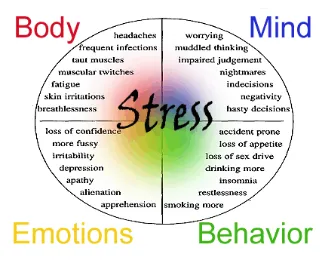Stress Management
Stress is any uncomfortable "emotional experience accompanied by predictable biochemical, physiological and behavioral changes" (American Psychological Association). Stress can affect people of all ages, genders and circumstances and can lead to both physical and psychological health issues. Stress is often described as feeling overwhelmed or worried or run-down. Stress can be beneficial at times, giving the person energy to get things done like exams or work deadlines. Too much stress, or extremely stressful experiences can lead to health problems, affecting immune, cardiovascular, and central nervous systems.

The term “stress” really should not be used. The real terms that should be used to accurately describe what someone is experiencing is Eustress and Distress.
Eustress: beneficial or “good” stress (e.g. like exercise or active positive engagement in hobbies and other recreational interests) that enhance our functioning.
Distress: unpleasant feelings or emotions that impact your level of functioning. This is what we normally associate with the word stress; something that doesn’t easily resolve itself despite our best efforts. This form can be chronic and debilitating, often times leading to anxiety and depression.
Symptoms of Stress
There are many warning signs and symptoms that may alert us that we are experiencing a significant amount of stress. They fall into three categories: physical, behavioral, and psychological.

Physical: muscle tension, headaches, exhaustion, sleep disturbance, teeth grinding, indigestion, sexual dysfunction, hypertension.
Behavioral: Distractibility, decreased production at work or school, procrastination, increased alcohol and drug abuse, cigarette smoking, conflict with others.
Psychological: Irritability, volatile mood, easily frustrated, feeling overwhelmed, forgetfulness, bouts of anger, crying spells, loss of sense of humor, and difficulty making decisions.
Self-Assessments
The following are some self-assessments from The American Institute of Stress you can take to gauge your level of stress.
Stress 360-explores elements of lifestyle, occupation, attitude, and diet to determine stress LOAD
Stress Sensitivity Scale-beta test
The Social Readjustment Rating Scale-measures the stress load we carry

If you are experiencing a significant amount of stress, or you took the above assessments and scored at a level that suggested there is a significant amount of stress in your life, consider scheduling an appointment to discuss this further. Don’t just think of this as a mental health issue, think of this as a LIFE issue. Remember stress can affect you in many ways, not just psychologically.
Treatment for Stress
Relaxation exercises: Learning how to relax your entire body is essential for reducing stress symptoms. Whether you do yoga, or meditation, or get a massage or any holistic modality that promotes relaxation; stress management starts with self-care. Progressive relaxation and other breathing exercises are often used to help identify problem areas such as tense muscles in neck, shoulder, increased heart rate, rapid shallow breathing. These exercises promote a relaxation response (e.g. slower deeper breathing, decreased muscle tension, lowered blood pressure and heart rate). With repeated use, all of these treatment modalities can have a lasting positive effect on the person suffering from stress.
Cognitive-behavioral therapy: CBT focuses on how people’s thoughts affect their emotions and behavior. This approach helps people learn how to combat negative thinking and reduce stress. By challenging irrational beliefs, reframing negative thoughts, implementing relaxation techniques and problem-solving skills, CBT can help people get control of their stress.
Psychopharmacology: Medication, like an anti-anxiety drug (e.g. Xanax, Valium, Ativan, etc) can help alleviate the physical symptoms of stress in the short run, but it doesn’t make the source of the stress go away. Not only that, those drugs are habit-forming, so continued use can create a level of tolerance and/or dependence that can result in more problems and stress!! There are other medications that can be prescribed to assist with anxiety symptoms created by the stress. Please discuss with an experienced medical professional if that is a route you want to explore.
